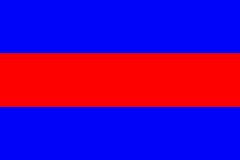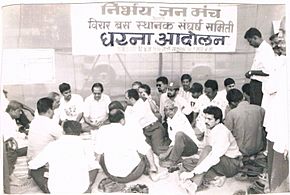Tehreek-e-Istiqlal facts for kids
Quick facts for kids
Tehreek-e-Istiqlal
تحریک استقلال
|
|
|---|---|
 |
|
| Leader | Asghar Khan |
| Founder | Asghar Khan |
| Founded | 1970 |
| Dissolved | 2012 |
| Merged into | Pakistan Tehreek-e-Insaf |
| Ideology | Islam and democracy Pakistani nationalism Progressivism Mixed economy Reformism Welfarism Minority rights |
| Political position | Centre |
| Religion | Islam |
Tehreek-e-Istiqlal (Urdu: تحریک استقلال) was a political party in Pakistan. For a time, it was the country's second most popular political party. It was started in 1970 by a retired Air Marshal named Asghar Khan.
Many famous politicians were once members of Tehreek-e-Istiqlal. These included people like Nawaz Sharif, Khurshid Mahmud Kasuri, Sheikh Rashid Ahmad, and Javed Hashmi.
After a disputed election in 1977, the military took control of the government. The new leader, General Zia-ul-Haq, banned political parties. Asghar Khan was placed under house arrest, which meant he was not allowed to leave his home for over four years.
In January 2012, Tehreek-e-Istiqlal joined with another party, the Pakistan Tehreek-e-Insaf (PTI).
Contents
History of the Party
How the Party Started

After leaving the military, Asghar Khan started the Tehreek-e-Istiqlal party in 1970. He created it as an alternative to the Pakistan Peoples Party (PPP), which was led by Zulfikar Ali Bhutto.
Tehreek-e-Istiqlal was a centrist party. This means its ideas were in the middle, not on the far left or far right of politics. Even so, it attracted many voters who had more conservative or traditional views.
During the 1970 election campaign, Asghar Khan blamed Zulfikar Ali Bhutto for helping to start the 1965 war with India.
Political Clashes
The 1970s were a time of intense political disagreement in Pakistan. On December 20, 1972, a politician named Khwaja Mohammed Rafique was killed in Lahore. He was on his way home from a protest organized by Tehreek-e-Istiqlal. The protest was against rising prices and was led by Asghar Khan. Khan called the attack a terrible act and blamed the government for not preventing it.
In another incident on April 29, 1973, the home of a Tehreek-e-Istiqlal leader was attacked after a rally by the ruling PPP. During the attack, his nephew was badly hurt and died a few days later. These events showed how tense politics were at the time.
The Party's Main Activities
In the 1970 Pakistani general elections, Tehreek-e-Istiqlal did not win any seats in the National Assembly of Pakistan. The PPP won a majority of the votes in the four provinces of what was then West Pakistan.
After the Indo-Pakistani War of 1971, which led to the creation of Bangladesh, Asghar Khan joined the National Assembly. He became a leading voice in the opposition against the new government of President Zulfikar Ali Bhutto. Khan criticized Bhutto's government, saying it was like a "one-party state" where other voices were suppressed.
In 1973, Khan also spoke out against the military operations in the province of Balochistan. His party received support from business leaders who were against the government's policy of nationalization (when the government takes control of private businesses).
By 1975, Khan helped form the Pakistan National Alliance, a large group of nine parties that joined together to oppose Bhutto's government.
The 1977 Election and Military Takeover
The party took part in the 1977 Pakistani general election but lost again. Party leaders did not accept the results and claimed the election was unfair. They called for large protests, known as dharnas, against the government.
During this time, Asghar Khan wrote a letter to the leaders of the military. In the letter, he suggested that they should not follow the orders of Bhutto's government, which he called "unlawful." Many historians believe this letter encouraged the military to take over the country. On July 5, 1977, the head of the army, General Muhammad Zia-ul-Haq, removed the government in a military coup called Operation Fair Play.
Struggles Under Military Rule
After the military takeover, Asghar Khan began to oppose the new military government of General Zia-ul-Haq. He called for democracy to be restored in Pakistan.
Khan later said that his letter was not a request for the military to take power. He explained he wrote it after hearing a story about a soldier hurting a civilian.
From 1979 to 1984, Khan was placed under house arrest in his home in Abbottabad. He was considered a prisoner of conscience by Amnesty International, an organization that works for human rights.
In 1983, he joined the Movement for Restoration of Democracy (MRD), an alliance of parties working to end military rule. However, he left the alliance in 1986. Many of his party's members then left to join other political parties.
Decline and Merger with PTI
After the 1980s, Tehreek-e-Istiqlal's popularity declined. Asghar Khan lost in the 1988 Pakistani general elections. He took a case to the Supreme Court of Pakistan, claiming that the military had unfairly funded other political parties.
In the late 1990s, Asghar Khan tried to merge his party with the Pakistan Tehreek-e-Insaf (PTI), a new party started by the famous cricketer Imran Khan.
In 2002, he passed the leadership of the party to his son, Omar Asghar Khan. After his son's death that same year, the party's influence faded further.
Finally, on December 12, 2011, Asghar Khan announced that he and his party were merging with Imran Khan's PTI. He said that Imran Khan was the best hope for Pakistan's future.
See also
- Politics of Pakistan
- History of Pakistan

